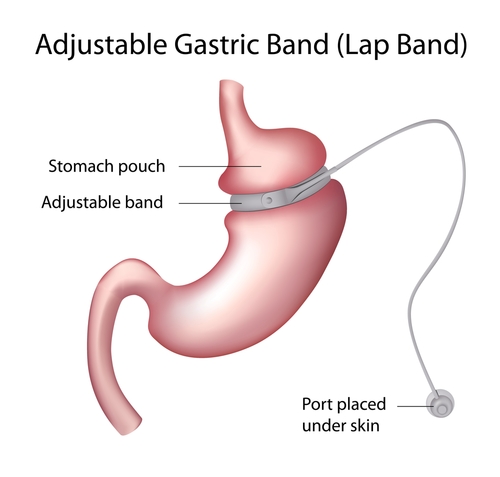[vc_row][vc_column][vc_column_text]As concerns over obesity and its impact on pregnancies continue to grow in the healthcare community, researchers are exploring viable weight loss options for pregnant women. With bariatric surgery gaining popularity, new studies have explored the safety and effectiveness of the gastric band and pregnancy, and whether this form of weight loss surgery is advisable for expectant mothers who are obese. Now, recent research is revealing that gastric banding is indeed safe for young women who are pregnant as well as for those who want to get pregnant in the future.
Obesity’s Potential Impact During Pregnancy
Obesity is a medical condition characterized by the accumulation of excess body fat, usually a result of the interplay between poor diet choices, sedentary lifestyle and genetic factors, affecting as much as 37% of young women aged 20 to 39 years. Obese patients are diagnosed using the calculation of the body mass index (BMI) and are at higher risk of heart disease, diabetes, obstructive sleep apnea, osteoarthritis and some types of cancer.
Furthermore, obesity is also associated with numerous negative impacts both in fertility and pregnancy. Obesity, due to the hormonal effects in the body including uncontrolled production of estrogen, is associated with irregular menstruation, infertility and miscarriage. In pregnancy, it has been shown in previous studies that obese women have a higher risk of pregnancy-associated diabetes and hypertension, large babies, and cesarean section, among others.
The management of obese women can be challenging. The first approach usually involves a combination of dietary changes and exercise. As most drugs used to lose weight have questionable efficacy, patients with obesity that is refractory (unresponsive) to these interventions are frequently advised to undergo bariatric surgery.
 The Gastric Band and Pregnancy: Safety and Efficacy
The Gastric Band and Pregnancy: Safety and Efficacy
The safest bariatric surgery method available today is called Laparoscopic Adjustable Gastric Banding, which is sometimes referred to as the “Lap Band” brand name, though there are other competing gastric band devices as well. In a gastric band procedure, the surgeon, through small (0,5-1,5 cm) incisions and with the help of a camera, inserts a silicone band around the stomach that restricts the nutrient intake by creating a narrow passage. Once inserted, the band’s tightness can be adjusted by the addition or removal of saline solution through a port placed under the skin.
A recent study entitled “Pregnancy after laparoscopic gastric banding: maternal and neonatal outcomes” published in 2014 in the International Journal of Surgery looked into the safety of bariatric surgery in both fertility and pregnancy complications. A team of researchers from the University of Salerno and the University of Naples Federico II, Italy, led by Dr. Vincenzo Pilone concluded, after studying data from 140 women between 18 and 46 years and 26 pregnancies, that the “Lap Band” is a safe procedure — including during pregnancy — and is not associated with complications for the mother or the fetus.
Of the 140 obese women of reproductive age (18-46 years old) studied who underwent LAGB between January 2006 and December 2011, 26 of these patients became pregnant, with a total of 22 babies born and 4 miscarriages. Researchers report that mean time from receiving the gastric band to becoming pregnant was 15.8 months. Band adjustments were performed at some point in 100% of patients during the first trimester of their pregnancies, and the average weight gain at the end of pregnancy was 14.66 kg.
The study revealed that none of the pregnant women experienced gestational or obstetrical complications because of the gastric band. One patient experience band slippage, which required surgery, and one patient presented iron-deficiency anemia, and 100% of deliveries were by cesarean section (common among pregnant women who are obese).
However, there were no perinatal complications or malformations recorded, and the average baby weight was 3027 g.
As discussed previously, obesity is an epidemic in the western countries associated with various health complications. Because it is difficult to manage, “weight loss surgery” is often needed to achieve the target weight. According to the findings of this research, laparoscopic Adjustable Gastric Banding is a very safe procedure with a mortality rate of 0.05% and is an alternative even for pregnant women with no negative implications for the baby.
Diogo Bruno is a OB/GYN resident at Centro Hospitalar Lisboa Ocidental and Hospital Prof. Dr. Fernando Fonseca. He has recently obtained a Harvard Medical School certificate in clinical research, and is also a lecturer and medical writer. He has also worked on various research internships, is a certified trainer and has presented works in gynecology and obstetrics at several key health meetings.
[/vc_column_text][/vc_column][/vc_row][vc_row][vc_column width=”1/2″][vc_wp_rss items=”7″ title=”Read Articles Related To Obesity & Pregnancy:” url=”https://obesitynewstoday.com/tag/pregnancy/feed”][/vc_column][vc_column width=”1/2″][vc_wp_text title=”Find Out More About Gastric Band Surgery:”]
[/vc_wp_text][/vc_column][/vc_row]

